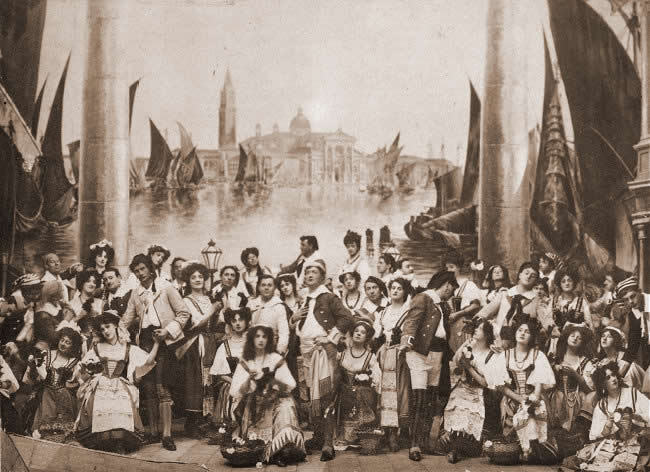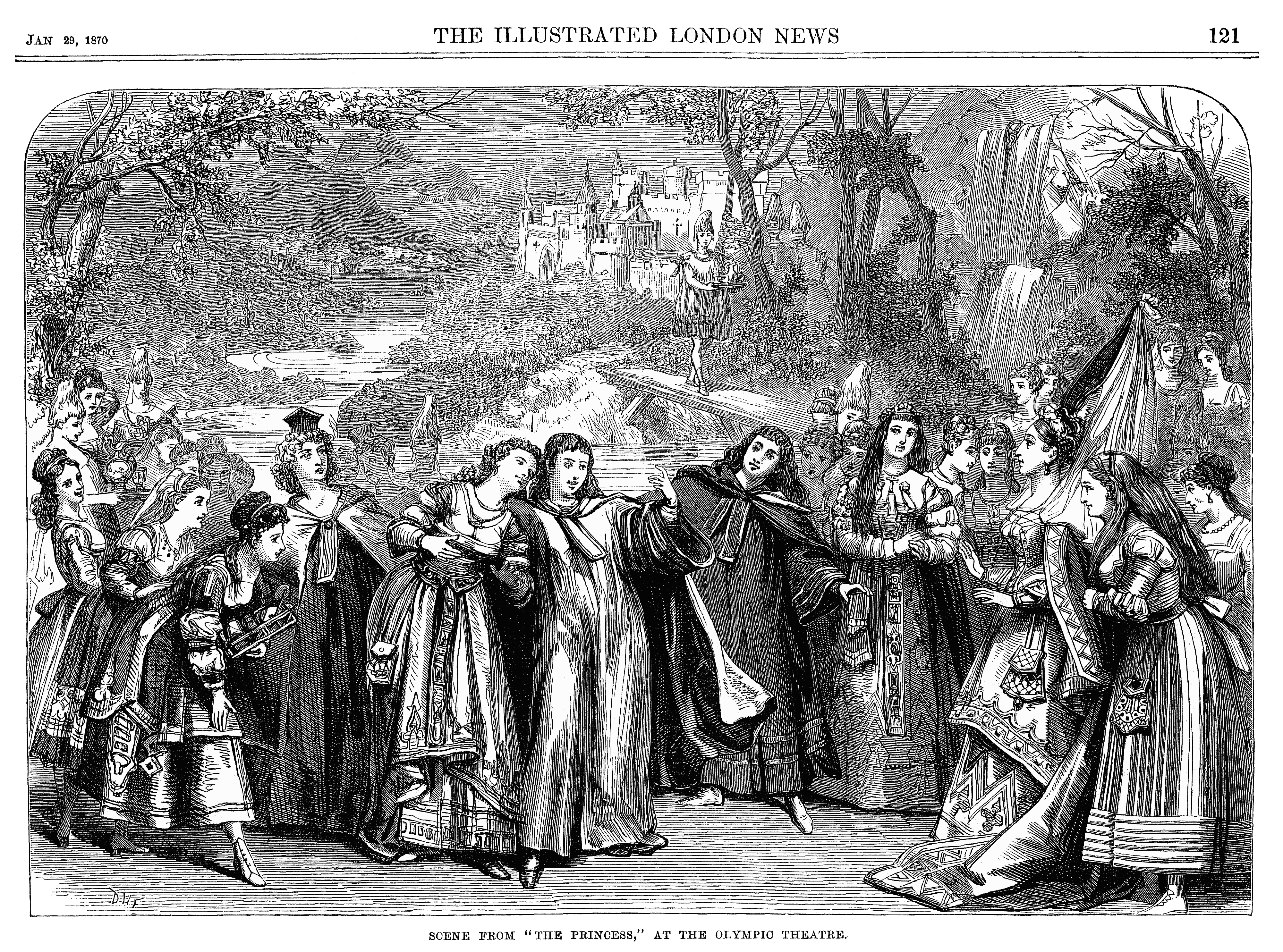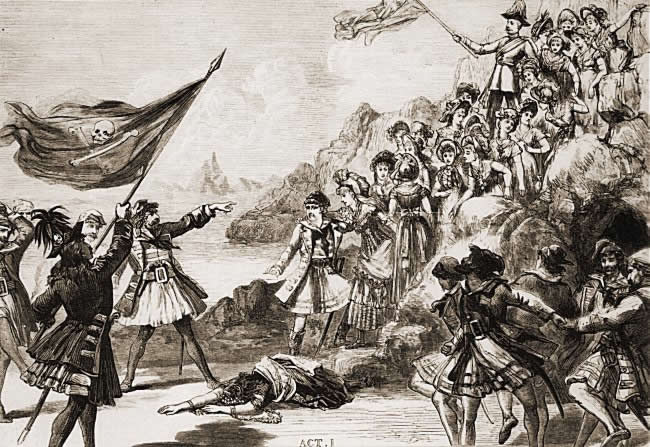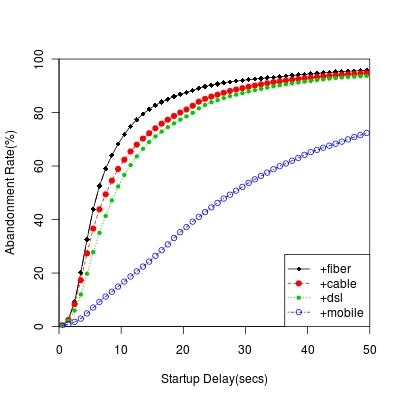|
C. H. Workman
Charles Herbert Workman (5 May 1872 – 1 May 1923) was a singer and actor best known as a successor to George Grossmith in the comic baritone roles in Gilbert and Sullivan operas. He was variously credited as Charles H. Workman, C. Herbert Workman and C. H. Workman. Workman joined the D'Oyly Carte Opera Company in 1894 and played several roles with the company in London before becoming principal comedian, for nearly a decade, with D'Oyly Carte touring companies. He was cast in the comic leads for the two London repertory seasons of Gilbert and Sullivan at the Savoy Theatre in 1906−07 and 1908−09, earning mostly enthusiastic reviews. After this, he left the company and took on the management of the Savoy Theatre. He soon fell out with W. S. Gilbert over his production of the dramatist's ''Fallen Fairies''; Gilbert banned Workman from appearing in his operas in Britain. Workman subsequently had leading roles in several West End musical comedies and operettas. In 1914 he re ... [...More Info...] [...Related Items...] OR: [Wikipedia] [Google] [Baidu] |
Workman Portrait
{{disambiguation ...
Workman may refer to: * Workman (horse) * Workman (surname), an English surname * Workman keyboard layout, an alternative English keyboard layout for ergonomic usage * Workman Publishing Company, an American publisher * Workman Township, Minnesota, United States See also * Worker (other) A worker is a member of the working class. Worker may also refer to: * Laborer, a person who performs unskilled physical labour, especially in construction * Worker, a member of the workforce ** Designation of workers by collar color lists vari ... [...More Info...] [...Related Items...] OR: [Wikipedia] [Google] [Baidu] |
The Mikado
''The Mikado; or, The Town of Titipu'' is a comic opera in two acts, with music by Arthur Sullivan and libretto by W. S. Gilbert, their ninth of fourteen Gilbert and Sullivan, operatic collaborations. It opened on 14 March 1885, in London, where it ran at the Savoy Theatre for 672 performances, the second-longest run for any work of musical theatre and one of the longest runs of any theatre piece up to that time.The longest-running piece of musical theatre was the operetta ''Les Cloches de Corneville'', which held the title until ''Dorothy (opera), Dorothy'' opened in 1886, which pushed ''The Mikado'' down to third place. By the end of 1885, it was estimated that, in Europe and America, at least 150 companies were producing the opera.H. L. Mencken, Mencken, H. L.]Article on ''The Mikado'', ''Baltimore Evening Sun'', 29 November 1910 ''The Mikado'' is the most internationally successful Savoy opera and has been especially popular with amateur and school productions. The work has ... [...More Info...] [...Related Items...] OR: [Wikipedia] [Google] [Baidu] |
The Rose Of Persia
''The Rose of Persia''; ''or, The Story-Teller and the Slave'', is a two-act comic opera, with music by Arthur Sullivan and a libretto by Basil Hood. It premiered at the Savoy Theatre on 29 November 1899, closing on 28 June 1900 after a profitable run of 211 performances. The opera then toured, had a brief run in America and played elsewhere throughout the English-speaking world. The original cast included Savoy Theatre regulars Ellen Beach Yaw, Rosina Brandram, Emmie Owen, Louie Pounds, Isabel Jay, Walter Passmore, Henry Lytton and Robert Evett. Later, Decima Moore joined the cast as Scent-of-Lillies. The opera was regularly revived by amateur theatre groups, particularly in Britain, through the 1950s, but it has been produced only sporadically since then. The New York Gilbert and Sullivan Players produced the opera professionally in 2007 at New York City Center. Background and original production When the Gilbert and Sullivan partnership collapsed after the production of ' ... [...More Info...] [...Related Items...] OR: [Wikipedia] [Google] [Baidu] |
The Gondoliers
''The Gondoliers; or, The King of Barataria'' is a Savoy Opera, with music by Arthur Sullivan and libretto by W. S. Gilbert. It premiered at the Savoy Theatre on 7 December 1889 and ran for a very successful 554 performances (at that time the fifth longest-running piece of musical theatre in history), closing on 30 June 1891. This was the twelfth comic opera collaboration of fourteen between Gilbert and Sullivan. The story of the opera concerns the young bride of the heir to the throne of the fictional kingdom of Barataria who arrives in Venice to join her husband. It turns out, however, that he cannot be identified, since he was entrusted to the care of a drunken gondolier who mixed up the prince with his own son. To complicate matters, the King of Barataria has just been killed. The two young gondoliers must now jointly rule the kingdom until the nurse of the prince can be brought in to determine which of them is the rightful king. Moreover, when the young queen arrives ... [...More Info...] [...Related Items...] OR: [Wikipedia] [Google] [Baidu] |
Princess Ida
''Princess Ida; or, Castle Adamant'' is a comic opera with music by Arthur Sullivan and libretto by W. S. Gilbert. It was their eighth operatic collaboration of fourteen. ''Princess Ida'' opened at the Savoy Theatre on 5 January 1884, for a run of 246 performances. The piece concerns a princess who founds a women's university and teaches that women are superior to men and should rule in their stead. The prince to whom she had been married in infancy sneaks into the university, together with two friends, with the aim of collecting his bride. They disguise themselves as women students, but are discovered, and all soon face a literal war between the sexes. The opera satirizes feminism, women's college, women's education and Charles Darwin, Darwinian evolution, which were controversial topics in conservative Victorian era, Victorian England. ''Princess Ida'' is based on a narrative poem by Alfred, Lord Tennyson called ''The Princess (Tennyson poem), The Princess'' (1847), and Gilb ... [...More Info...] [...Related Items...] OR: [Wikipedia] [Google] [Baidu] |
The Pirates Of Penzance
''The Pirates of Penzance; or, The Slave of Duty'' is a comic opera in two acts, with music by Arthur Sullivan and libretto by W. S. Gilbert, W. S. Gilbert. Its official premiere was at the Fifth Avenue Theatre in New York City on 31 December 1879, where it was well received by both audiences and critics. Its London debut was on 3 April 1880, at the Opera Comique, where it ran for 363 performances. The story concerns Frederic, who, having completed his 21st year, is released from his apprenticeship to a band of tender-hearted pirates. He meets the daughters of Major-General Stanley, including Mabel, and the two young people fall instantly in love. Frederic soon learns, however, that he was born on the 29th of February, and so, technically, he has a birthday only once each leap year. His indenture specifies that he remain apprenticed to the pirates until his "twenty-first birthday", meaning that he must serve for another 63 years. Bound by his own sense of duty, Freder ... [...More Info...] [...Related Items...] OR: [Wikipedia] [Google] [Baidu] |
The Sorcerer
''The Sorcerer'' is a two-act comic opera, with a libretto by W. S. Gilbert and music by Arthur Sullivan. It was the British duo's third operatic collaboration. The plot of ''The Sorcerer'' is based on a Christmas story, ''An Elixir of Love'', that Gilbert wrote for ''The Graphic'' magazine in 1876. A young man, Alexis, is obsessed with the idea of love levelling all ranks and social distinctions. To promote his beliefs, he invites the proprietor of J. W. Wells & Co., Family Sorcerers, to brew a love potion. This causes everyone in the village to fall in love with the first person they see and results in the pairing of comically mismatched couples. In the end, Wells must sacrifice his life to break the spell. The opera opened on 17 November 1877 at the Opera Comique in London, where it ran for 178 performances. It was considered a success by the standards of that time and encouraged the collaborators to write their next opera, ''H.M.S. Pinafore''. ''The Sorcerer'' was r ... [...More Info...] [...Related Items...] OR: [Wikipedia] [Google] [Baidu] |
Iolanthe
''Iolanthe; or, The Peer and the Peri'' () is a comic opera with music by Arthur Sullivan and libretto by W. S. Gilbert, first performed in 1882. It is one of the Savoy operas and is the seventh of fourteen operatic collaborations by Gilbert and Sullivan. In the opera, the fairy Iolanthe has been banished from fairyland because she married a mortal; this is forbidden by fairy law. Her son, Strephon, is an Arcadia (utopia), Arcadian shepherd who wants to marry Phyllis, a Ward (law), Ward of Court of Chancery, Chancery. All the members of the House of Lords, House of Peers also want to marry Phyllis. When Phyllis sees Strephon hugging a young woman (not knowing that it is his mother – immortal fairies all appear young), she assumes the worst and sets off a climactic confrontation between the peers and the fairies. The opera satire, satirises many aspects of British government, law and society. The confrontation between the fairies and the peers is a version of one of Gilbert's ... [...More Info...] [...Related Items...] OR: [Wikipedia] [Google] [Baidu] |
Patience Bunthorne And Jane
(or forbearance) is the ability to endure difficult circumstances. Patience may involve perseverance in the face of delay; tolerance of provocation without responding in disrespect/anger; or forbearance when under strain, especially when faced with longer-term difficulties, or being able to wait for a long amount of time without getting irritated or bored. Patience is the level of endurance one can have before disrespect. It is also used to refer to the character trait of being steadfast. Antonyms include hastiness and impetuousness. Scientific perspectives In psychology and in cognitive neuroscience, patience is studied as a decision-making problem, involving the choice of either a small reward in the short-term, versus a more valuable reward in the long-term. In 2005 a study involving common marmosets and cottontop tamarins, animals of both species faced a self-control paradigm in which individuals chose between taking an immediate small reward and waiting a variable ... [...More Info...] [...Related Items...] OR: [Wikipedia] [Google] [Baidu] |
La Grande-Duchesse De Gérolstein
''La Grande-Duchesse de Gérolstein'' (''The Grand Duchess of Gerolstein'') is an opéra bouffe (a form of operetta), in three acts and four tableaux by Jacques Offenbach to an original French libretto by Henri Meilhac and Ludovic Halévy. The story is a satirical critique of unthinking militarism and concerns a spoiled and tyrannical young Grand Duchess who learns that she cannot always get her way. The opera premiered in Paris in 1867 and starred Hortense Schneider in the title role. Thereafter, it was heard in New York, London and elsewhere, and it is still performed and recorded. Background Offenbach's career was at its height in the 1860s with the premieres of some of his most popular and enduring works, such as ''La Belle Hélène'' (1864) and '' La Vie parisienne'' (1866). With the original production of the latter still running, Offenbach and his librettists hurried to prepare a new opera, ''La Grande-Duchesse de Gérolstein'', to play during the Paris Exposition ('' Expo ... [...More Info...] [...Related Items...] OR: [Wikipedia] [Google] [Baidu] |
The Yeomen Of The Guard
''The Yeomen of the Guard; or, The Merryman and His Maid'', is a Savoy Opera, with music by Arthur Sullivan and libretto by W. S. Gilbert. It premiered at the Savoy Theatre on 3 October 1888 and ran for 423 performances. This was the eleventh collaboration of fourteen between Gilbert and Sullivan. The opera is set in the Tower of London during the 16th century, and is the darkest, and perhaps most emotionally engaging, of the Savoy Operas, ending with a broken-hearted main character and two very reluctant engagements, rather than the usual numerous marriages. The libretto does contain considerable humour, including a lot of pun-laden one-liners, but Gilbert's trademark satire and topsy-turvy plot complications are subdued in comparison with the other Gilbert and Sullivan operas. The dialogue, though in prose, is quasi-William Shakespeare, Shakespearean, or Early Modern English, early modern English, in style. Critics considered the score to be Sullivan's finest, including its ... [...More Info...] [...Related Items...] OR: [Wikipedia] [Google] [Baidu] |
Old Sarah
Old or OLD may refer to: Places *Old, Baranya, Hungary *Old, Northamptonshire, England *Old Street station, a railway and tube station in London (station code OLD) *OLD, IATA code for Old Town Municipal Airport and Seaplane Base, Old Town, Maine, United States People *Old (surname) Music *OLD (band), a grindcore/industrial metal group *Old (Danny Brown album), ''Old'' (Danny Brown album), a 2013 album by Danny Brown *Old (Starflyer 59 album), ''Old'' (Starflyer 59 album), a 2003 album by Starflyer 59 *Old (song), "Old" (song), a 1995 song by Machine Head *''Old LP'', a 2019 album by That Dog Other uses *Old (film), ''Old'' (film), a 2021 American thriller film *''Oxford Latin Dictionary'' *Online dating *Over-Locknut Distance (or Dimension), a measurement of a Bicycle wheel#Construction, bicycle wheel and frame *Old age See also *List of people known as the Old * * *Olde, a list of people with the surname *Olds (other) {{disambiguation, geo ... [...More Info...] [...Related Items...] OR: [Wikipedia] [Google] [Baidu] |





.jpg)



